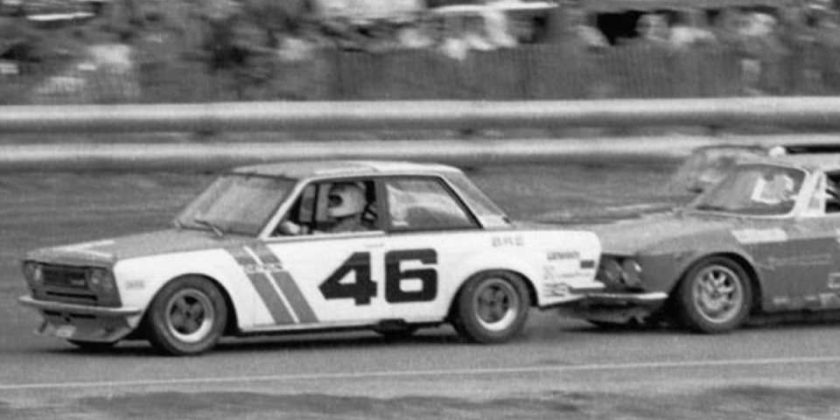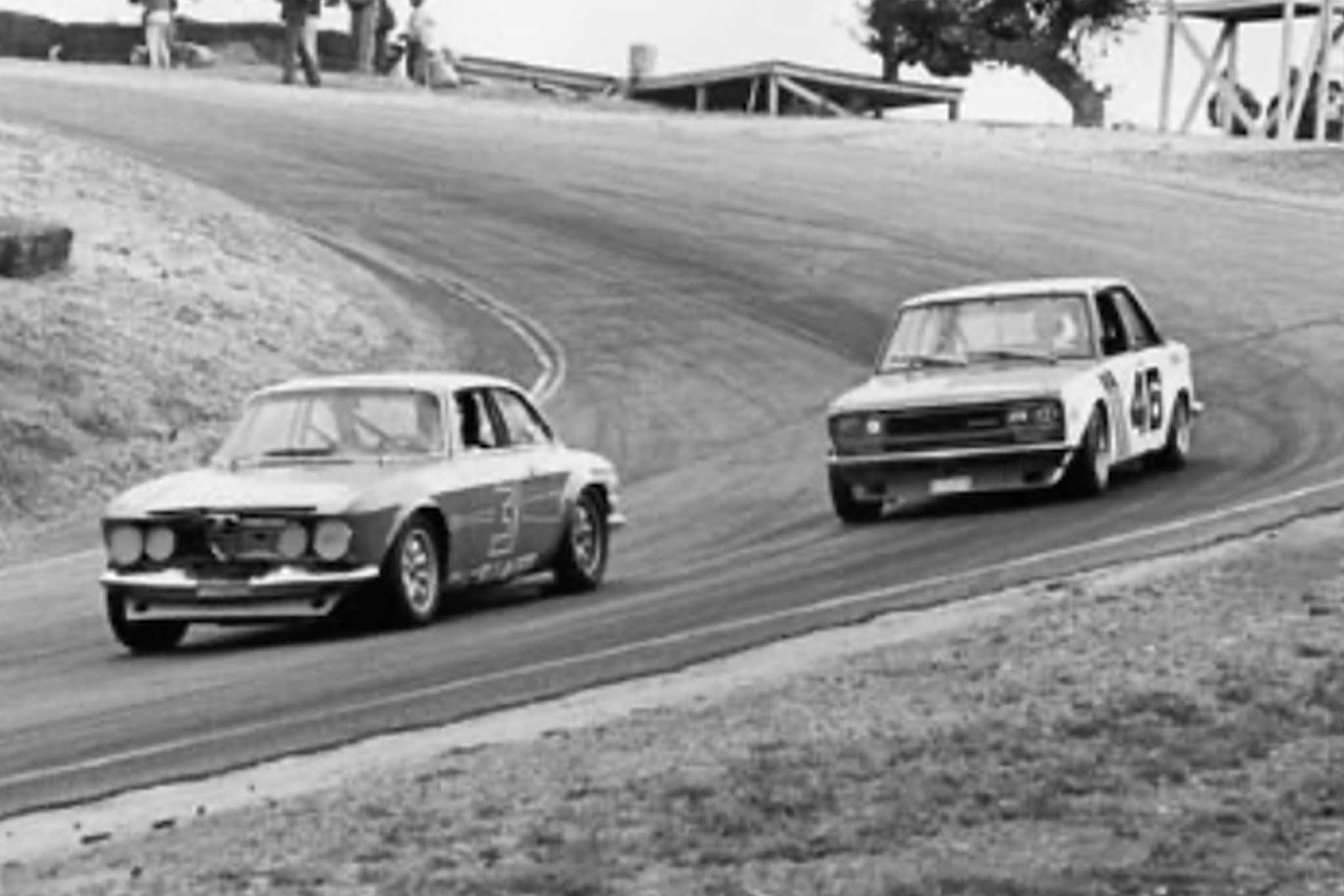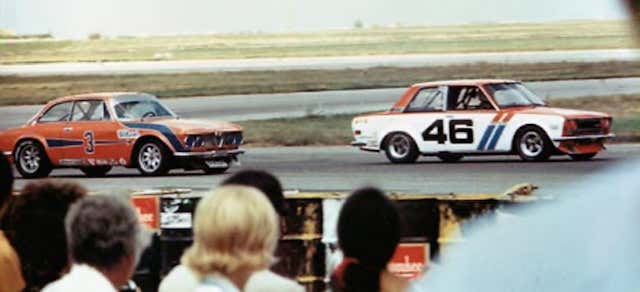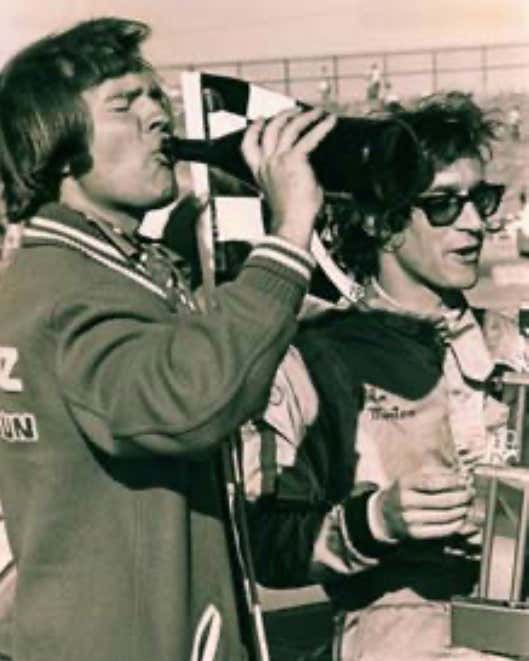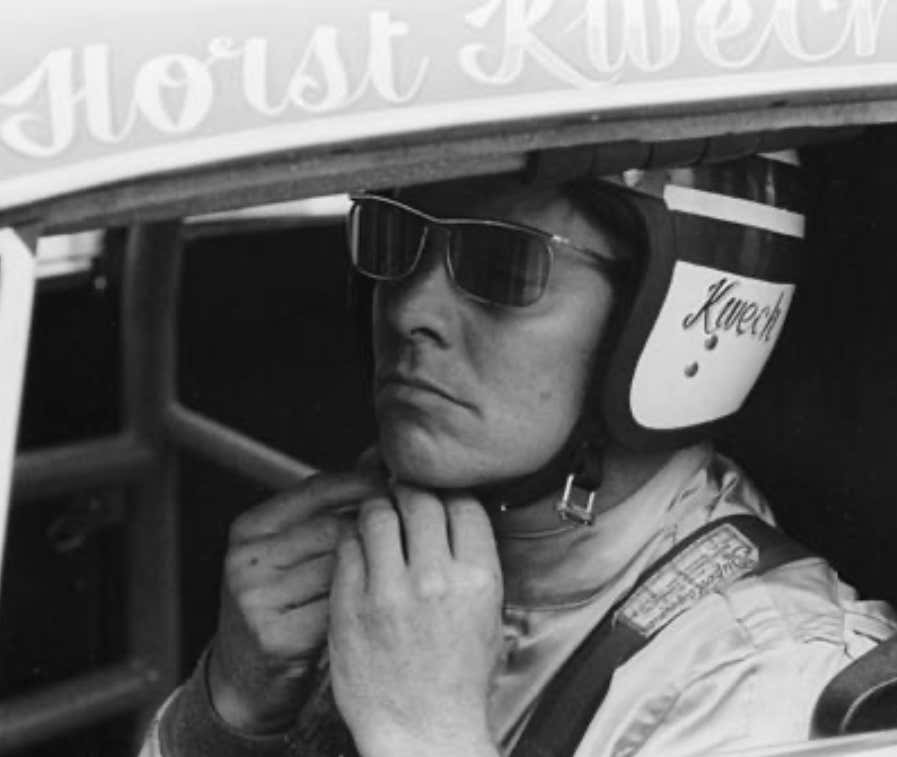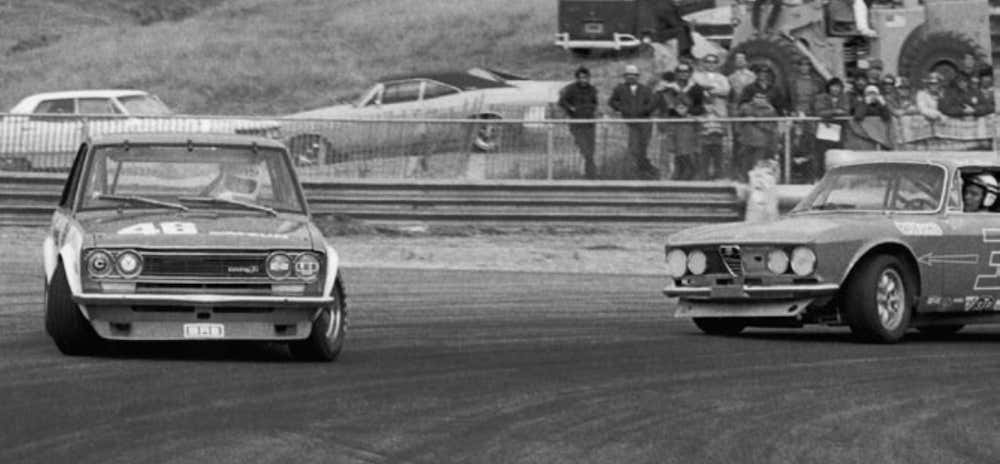If you’ve ever attended a race like the Indianapolis 500, you know just how colorful the trackside memorabilia stands are. They dot dedicated sections of the infield, luring you in with vintage flags, enamel pins, and books, along with a shouting vendor or two. Or 10. Regardless, that’s where you find the treasures. The Stainless Steel Carrot is one such classic book you’d be lucky to score, with its re-telling of the BRE Datsun team’s Trans Am racing triumph from the early ’70s.
It was written by novelist Sylvia Wilkinson, who was given complete and total access to the factory-backed outfit by owner and manager, Pete Brock. There’s a healthy dose of garage talk that provides the great quotes you’d expect from a crew full of racers who transitioned quickly from newcomers to championship winners—especially the team’s bespectacled ace driver, John Morton. Simply put, if you love that red, white, and blue Datsun 510, or racing history in general, this is a must-read.
Thing is, The Stainless Steel Carrot isn’t easy to find in physical form; you’ll scour eBay or Amazon and pay a (deservedly) high price once you do come across a copy. Fortunately for you and me, it’s now available digitally for $10 thanks to Carrara Media. You can even score a bookmark autographed by Wilkinson and Morton for your non-digital reading.
We’ve got a decently sized excerpt to share with you in case you’re interested, which you should be. Here’s Wilkinson, who spent two seasons embedded in the team as it fought hard against the similarly pint-sized giants of Trans Am’s 2.5 class. Ultimately, no Alfa Romeo could defeat Morton and Brock’s No. 46 Datsun and few racing novels from the time can rival Wilkinson’s work.
Enjoy the book’s fifth chapter here!
Setting: A bar prior to the 1972 SCCA Trans-Am 2.5-Liter Season Opener at Lime Rock
Characters: Horst Kwech, driver for Alfa Romeo; John Morton, driver for BRE Datsun
Context: This passage illustrates a beer-soaked evening shared by Kwech and Morton, friends but rivals, and the two drivers favored to win the 1972 national championship.
The drivers discuss the 1971 season finale at Laguna Seca – Kwech, trailing Morton, punted the rear quarter panel of the Datsun in the corkscrew and sent it spinning as he took the lead in the Alfa. Morton charged back but fell short because Kwech did not stop to refuel. It was later discovered that the Alfa’s fuel tank was larger than series rules allowed – Kwech was disqualified and Morton was named the winner, sealing thechampionship. Morton and the BRE team suspected Kwech knew it all along. Kwech
denied it.
Morton struggled with the fact that he decided not to hit Kwech back, allowing the fans to watch Kwech take the checkered flag, even though he walked away with the title. It set up a highly anticipated 1972 season with both drivers ready for battle.
At first observation Horst Kwech’s feelings seem to be transparent. His cockiness shows readily, his eagerness to drive and drive often, his letdown when losing. He is dead serious about this whole business but he enjoys it. His grin that is there most of the time may be a protective grin, an attempt to look confident and sure, to complete the cat-and-mouse game that he thinks is an advantage, communicating to the Brock team that he feels readier because he hasn’t let anything distract him from winning this year. On the other hand, his sureness might be quite natural. Horst has been around racing a long time, through extreme ups and downs, and his personality seems to take care of him well.
“You know, I have never met anyone like Horst,” his wife Dotty explains. “Losing just doesn’t seem to get him down. It does to lose a good friend in racing, like Jerry Titus, who was such an intelligent and talented guy, but Horst gets right back up and at it again. He’s quite a guy, that Horst.” Tonight Horst is quite drunk, and talkative, drinking gin and tonic while constantly reminding the others that “…the gin and tonic isn’t what is saying this to you.” His eyes are bloodshot and he looks a wreck, but there is a full day and this evening before qualifying, so he has tomorrow to sleep it off. Physically and mentally, Horst seems to have the ability to bounce back up. Like one of those weighted balloon clowns that a child can punch, he
is back up before you have your fist balled up.
Kwech’s crew is around when he sits down with John but they soon leave, with a few words from Bobby Jones, a Southern crew member formerly with Bud Moore’s stock-car outfit from South Carolina. Jones isn’t happy in Illinois because “…people don’t treat you right. They don’t care anything about you.” Ian, Horst’s Australian crew member, is dressed up and going where there is live music.
“Live music up here?” John asks. “I didn’t even think there were live people.” They leave, seeming anxious to get away before Horst starts telling stories they’ve heard too many times before. Horst sits down. There is little variety in conversational subject matter around racers and sometimes the less committed prefer to escape it. The more committed can sustain their racing talk to the point of absurdity, as if their equilibrium would be lost if less than 99 percent of their waking hours were devoted to racing. There is an undefined fear that other interests might knock the edge off their commitment. They must believe they gave it their all, that no diversion kept them from their goal. Give them a questionnaire with a space for “hobbies.” If they indicate something other than racing, you can be sure they’ve justified it as useful to racing; and whether it’s a related diversion like a cycle, or unrelated like a boat, you can be sure the man totally committed to being World Champion doesn’t look casually upon “hobbies.”
There is often an aimlessness and a deep loneliness about the crew members when the cars are tucked away. They work long hard hours with as much disregard for human pleasures as anyone in any profession or sport. They also play hard but only in proportion to the amount of energy they have left over. Racing takes more than dedication; it would be naive to define its demands as just that. Racing requires a disregard for your lifestyle, everything else has to come second. At the races, if there is a time lag before the performance, and if the car is ready, you have a bunch of people who don’t know what to do with themselves. The ones with families don’t usually have them there, and the ones without families are about the loneliest people in the world, although they might be the kinder for not involving a family. This is the sort of reasoning that belongs to people on the outside, to wives who are left at home. It doesn’t come from the people involved. They figure what they’re doing is hard enough without adding guilt and another
responsibility to their troubles.
That’s John Morton on the right.
Horst is having trouble talking. His words are garbled but it gradually becomes evident that he has a dime in his hand and as soon as he can get through on the phone he is going to make a call to see how his “little bloke” is doing. His first child, little Horst, who is five months old now, was born between the racing seasons. Horst is thirty-four. Dotty has said of Horst as a father, “We thought we’d never have any children, now Horst wants more. He is very good with the child. It is surprising because Horst is so very
independent.”
“He has the bluest eyes you have ever seen,” Horst says. “I don’t know where he got them because Dotty’s eyes are brown, but he has these bright blue eyes. Twenty pounds and twenty-seven inches long. Not going to be like me. Going to be tall like his grandfather who is six foot four.”
“How tall are you, Horst?” John asks in a puzzled voice. From John’s five-foot-eight frame, Horst doesn’t seem particularly short.
“Five foot ten. Going to be tall like his grandfather. The doctor said if he was already twenty-seven inches long, he was going to be over six feet. Already been in a race car and he loved it.”
Horst rambles on about the child, getting up again to try the phone. He gets his call through and then he seems happier, but soon he swings back, talking about the cars: “We’re ready for you this time. We have done nothing for five months but work on those cars. I was eating Sharp up in the turns. Brock hasn’t put the time in the cars and it is showing.”
Sharp had said that he let Horst by because there was no need of racing with him in practice. But people have been in a vacuum all winter, testing and running against their old times at their local tracks. They are quick to want answers, grabbing at the slightest indication their work was not in vain.
“I don’t like Brock and you know why? Because he isn’t a genuine man. I got nothing against you, John. You’re a damn good driver. But I want to beat that goddamn Brock.”
“We haven’t put the time in the cars we should have,” John confesses. “Brock let too much time get involved in customer stuff but the big thing was that parts business. We’re lucky to be doing as well as we are.”
Horst is called to the phone. He talks loudly, arguing with someone and soon he slams the phone down and comes back mad.
“That son-of-a-bitch Everett, excuse the French. I don’t know what happened to his goddamn wheels.”
“What’s wrong? He won’t be driving with you at all then?”
“No. He’s not his own man. All that astrology business, whether the stars are right. And the way he talks in front of women, you know what I mean, there’s something crude about Bert. People think that star business is funny but it isn’t when you have to work for the guy. You imagine a guy not wanting to drive when the stars are wrong and you’ll see what I mean. He’s too old anyway. He’s in his fifties. Anybody ought to quit when they get to thirty-nine. I’ll quit by then.”
“Do you think you could be happy building cars?”
“Yes. Definitely.”
“I remember once in Detroit when you were helping me with my Super 7 and I didn’t know anything about it. You told me then you could be happy not driving. But didn’t you try it once?”
“Yeah. It didn’t work out but that was because I could go faster than my driver. It would have to be when I was damn sure that the guy out there could drive the car faster than I could. I hadn’t counted on being faster than him.”
“I couldn’t even imagine not driving, just preparing the car for someone.”
Horst’s conversation with Bert seems to have sobered him up. He seems definite now, more coherent.
“I do it all now, the car and the driving,” he says. “I think it would be nice to have some time of my own and that I would like it when I could turn the driving over to someone. My little bloke is going to need him a father too, you know.”
Horst goes back to the baby’s physique again, twenty-seven inches long, twenty pounds, and his eyes get blurred. No doubt about it, the child has changed his whole life. Yet he talks of the child needing a father just when he is about to start a season of the most dangerous racing he has ever been involved in: the Continental 5000. His mind seems to swing back and forth, from one thing to the other, his conversation a mass of contradictions that aren’t simply the product of alcohol. He does not appear ever to have stood back, looked at his attitudes and said to himself: “Damn, they do contradict.” Or maybe it’s just that he’s not admitting it. I want my kid to have a father and I am going into a racing series that is the most dangerous and most competitive that I can get involved in. You don’t envy the crisis he is going to have with himself in the years before he reaches his cut-off point of thirty-nine.
“Oh, I tell you, John. Wait till you get in that A car, there is more than a little truth in what AutoWeek said, about how you and I were going to have a try at something different and they would just wait and see if we could do it. I took it out to test and when I got out, I tell you, my right foot shook. You don’t know what it can be like until you get in it and put your foot down through a turn. I tell you, it’s scary.”
“Yeah. You are going to have to modify your Laguna driving technique.”
Horst Kwech in his Alfa.
Horst starts to laugh. “You know what is the matter with you, Morton? You are just too nice
a guy. That’s right. Too nice a guy.”
“I’m afraid you aren’t the first person who’s said that.”
“You’re too nice. You need some Trans-Am experience. That’s why guys like Parnelli and Follmer are so good. They don’t shy away from contact. A bloke gets in their way and they knock him out of it, you know what I mean? You left yourself wide open at Laguna to be crashed and I meant to teach you a lesson.”
“I think there was more involved than that. I’ll admit it surprised me that you did it there. But I had some of that contact with you earlier.”
“You see, I lost nothing by being disqualified. Everybody out there saw me win and they saw you lose.”
“But there was more at stake than bashing back and forth between us. At least I sure felt it.”
“Now, John. You don’t believe that stuff, do you? That meant nothing, the manufacturers. It
was just between us out there, you know that.”
“I don’t think so. Maybe not for you but I know I was thinking about all the money at stake. I’ve never been involved in anything that expensive before. But I will admit I was mad enough to hit you after the corkscrew. It was just lucky that I had cooled off by the time I was able to catch back up to you.”
“That was unlucky. You should have stayed mad. You aren’t going to make it unless you stay mad.”
“OK, I’ve got to ask you. Why did you go out there with an illegal gas tank when you knew you had a good engine and had time to fix the filler? You knew you would be caught for that and you had a good chance to win squarely.”
Horst hesitates for a moment. “You won’t believe this, John, but I just didn’t know. I honestly didn’t know.”
“You mean you didn’t know that the container for the gas tank was this much” — he holds his hands apart about four inches — “this much too big and you work on the cars yourself?”
“I work on the cars but there are some parts I never look into. That part of the car, I didn’t think about all week I had so much else on my mind.”
“Then who did it?”
“I don’t know. I honestly don’t know.”
“Then how did you think you had enough gas to make it? You knew you were committed to try.”
“I just hoped I made it and when I went over the line and the engine cut off, I said, Horst, you lucky bloke. I was sure I was out of gas and got out and it was just a wire off. We checked the tank and the car had used only twelve gallons and we could have made it. I beat you out there, you know. I could have beat you driving anyway that day. Your engine was off and I’ve seen you drive better. the pressure was getting to your driving.”
John lets the subject drop.
“But we are going to get you this season,” Horst goes on. “And it will do me the greatest good to beat Brock. He is an arrogant man and I don’t like arrogance. Herbie doesn’t like to lose. He is spoiled and rich and he wants to win. I tell you about Herbie. He started with one restaurant at twenty-one and he couldn’t do anything wrong. Wetson’s hamburgers, now he has done the same thing with Mama’s Pasta. Everything he touches turns to gold. But Herbie wants to win at the racing. He can make money and the accumulation of it, though he won’t quit trying, doesn’t give him what he wants out of life. He wants to win at racing because it’s harder than making money.
“I’ll tell you about this year. People win in this sport every other year, you look at it. Every time somebody has a really big up year, they can’t do anything right the next year, you know I’m telling the truth. Brock got too sure of himself this year and didn’t get ready soon enough and he is going to pay for it. He thinks he is some kind of Roger Penske and thinks he can run people’s lives. You shouldn’t let him run things for you, you know? Take Mark Donohue. He isn’t his own man. He lives in the image of Penske and his whole life is controlled. And you, John, you’re a damn good driver. You just aren’t going to make it unless you get over this good-guy stuff.”
“Yeah, but I don’t have any Trans-Am ambitions, Horst. This just happened to come along. Actually I can get pretty embarrassed about all the time and attention that is given to driving a bunch of little shitboxes. I never once thought that Trans-Am would be an end in itself for me, even one of the big cars. I would like to drive one just for the experience but that is not where I want to go.”
Horst looks blank for a moment. He seems unable to understand what John is saying. He looks down at his drink. It is unclear whether he is digesting what John said or if John said something that can in no way penetrate his idea of racing. Or maybe, even though he hasn’t said so yet, the Formula A car that he tested has already started to change his attitude toward driving a race car.
The next time John sees Horst’s wife Dotty, he asks about the size of the baby and finds it is not as large as Horst had reported.
“Take the baby’s length and weight and make a formula. Then take the horsepower and lap times he says he is getting, and we’ll get to the truth.”
RELATED
Watch a 44-Year-Old Datsun 280Z Get Washed for the First Time Ever
Decades of dust disappear under the gentle hands of some of America's best detailers.READ NOW
RELATED
Datsun 240Z Designer Yoshihiko Matsuo Dead at 86
Matsuo's willingness to challenge his bosses willed forth an iconic sports car.READ NOW
RELATED
This Is Why This 1971 Datsun 240Z Sold for $310,000
This is how you justify your new, expensive toy to your significant other.READ NOW
Source: Read Full Article
